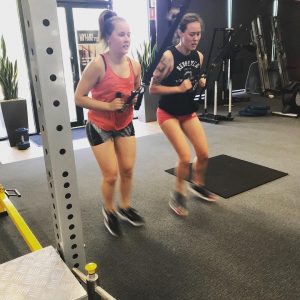3 Things that Changed My Life with Lupus Fatigue, Part 1

Photo by Shutterstock Chronic illness like lupus sometimes forces one to live on its terms.
First in a series.
In the past two years, I’ve written nearly 150 columns for Lupus News Today. I’d guess that at least 50 are in some way related to fatigue. The reason a single topic is featured so regularly in my work is that fatigue single-handedly affects me more than every other lupus symptom combined.
Usually, I write about the struggle, but today I’m here to write about my long journey to a place of victory. This is the first of a three-part series about the three things that have changed my life with lupus fatigue.
Part 1: The gym
Fatigue changed my life. I wasn’t an overly sporty kid, but I was a very active teen. At the age of 10, I fell wholeheartedly and passionately in love with surfing. By 17, I had been training and competing in surfing and stand-up paddleboard racing for five years at local, state, and national levels. Six months before I turned 18, I had a world ranking in junior stand-up paddleboard surfing. Attending a sports school toward the end of my secondary education, I found a love not just for being in the water but also for all forms of physical activity.
At 20, I was diagnosed with lupus, and my fast-paced, active life ground to an abrupt halt. I no longer had the energy to get up early and surf just for the love of it. In fact, I didn’t have the energy to get up — full stop. Everything was an effort, and even existing felt like a struggle. When life becomes a battle just to find the will to open your eyes in the morning, everything else is put on the back burner — not because you want it to, but because there is no other choice.
My dad is notorious for humbly bragging about my accomplishments in the stand-up paddleboard world. He mentioned these to my nephrologist, who made me promise to become active again. Physical activity was another prescription for treatment, another type of medicine to make me feel better.
In mid-2016, an old classmate who happened to be a personal trainer wrote to me after reading my columns. After more than a couple months of lying on the couch, I finally filled the script and signed up at the gym.
My first session involved the lightest weights the gym had, and by the end of it, I was on the verge of vomiting. Lupus had taken its toll: My body was beaten down and exhausted. But there was no doubt in my mind that this was my turning point. I could choose to barely exist and let lupus dictate the rest of my life or I could shake that monster off my back, stand up, and choose to live on my terms.
Looking back over the last two years, it was the best decision I’ve ever made.
Transforming my entire life began with making a single decision and saying yes to it over and over again. It wasn’t an easy choice. The first couple of months had nothing to do with wanting to go to the gym and everything to do with needing to be there. Every time I said yes to going to a PT session, I said yes to myself, to my health, and to my recovery. Each time I said yes, I reaffirmed that this life was mine and I was taking it back from lupus.
“Yes” is my battle cry. That little three-letter word reminds me how far I’ve come, how much I’ve achieved, and how much more I am capable of. That three-letter word is my affirmation of a life that is defiant of a chronic devil and my promise to lupus that I won’t be going down without a hell of a fight!
Next week: How regular gym sessions coupled with an IV iron infusion took me from a sad couch potato to an overly enthusiastic tourist in Europe.
***
Note: Lupus News Today is strictly a news and information website about the disease. It does not provide medical advice, diagnosis, or treatment. This content is not intended to be a substitute for professional medical advice, diagnosis, or treatment. Always seek the advice of your physician or other qualified health provider with any questions you may have regarding a medical condition. Never disregard professional medical advice or delay in seeking it because of something you have read on this website. The opinions expressed in this column are not those of Lupus News Today, or its parent company, Bionews Services, and are intended to spark discussion about issues pertaining to lupus.









Nita
I've been newly diagnosed. Does regular exercise, even when you body seems to ache everywhere, help in the overall sense of the disease?
Kristiana Page
Hi Nita,
To start off I just need to clarify that I'm not actually a medical professional, everything I post is purely based on my own personal experience with lupus and what does work for me is by no means a solution for everyone :) As I don't have bodily aches I can't say how it may or may not affect that particular lupus symptom, however I can attest that in the long run regular exercise has made a huge difference to my energy levels and genuinely changed my life.
My doctor recommended to me that I exercise and there has was a recent Australian study on cancer treatment that found physical activity helps pump medication around the body more effectively and helps on the journey towards remission.
As your newly diagnosed, my suggestion would be to first ask your doctor about exercise. If they recommended it then my advice would be to find a personal trainer who understands your situation. It's important to find someone who can understand the difference between when you're struggling because of lupus and when you just need that extra push for motivation and that's not an easy thing to find!
Lastly, listen to your body and take the breaks you need. I'm feeling the best I ever have since my diagnosis two years ago but there are still days when fatigue is right on top of me. It's not easy to fight back against fatigue, it's constantly a battle of give and take. Some days I win, some times I'm back on the couch for the day. But it's about the mindset more than anything. It's about being able to say, "Today is not my day, I need to rest, it's time to sit this one out. But next time - or next week or whenever your next session is - I'm back at it!".
Please write again if you have any questions, there's a whole community here who know exactly what it's like to be new to the lupus life and we're here to support you! :) Hope I could help even a tiny bit. Good luck! X
Beth
Thank you for this. I've been looking for other athletes with Lupus. I'm entering the end of my first year after diagnosis. I've watched my athletic abilities decline for the last three years, I thought it was a factor of age, I was diagnosed at 50, after the all over body aches and constant feeling of flu for three months sent me to the doctor thinking I had lyme, the blood tests showed an incredible amount of inflammation and a positive ANA (no lyme) off I went to the rheumatologist for quite a ride, the first rheumatologist wasn't on the same page with me and my need to be active, the look on his face (at our second appointment, I had been on Plaquenil for 3 months at that point, and feeling ok) when I explained what I experienced after a bike ride in February, his comment was, "Who rides a bike in February in New England." and the look on his face was as if he was looking at a lunatic. It was a beautiful 50 degree sunny day and I have the correct clothing for the activity. I found a rheumatologist who was willing to listen and understand how I live my life, and what makes me happy, and how difficult this diagnosis has been on me mentally as well as physically. A happy patient is a compliant patient. While I can't do everything I once did at the vigor and pace, I can still get outside and enjoy recreational running, biking, and hiking (just not on the same day). I need my rest and if I am going to overexert myself I know I will need a nap, a lot of water, and to go to bed early! It is about figuring out what works for you, we are all very much individuals and our disease may have the same name, however it acts differently on each of us. I also am not a medical professional.
Kristiana Page
Hey Beth!
Glad we can relate! I was actually prompted by my nephrologist to get back into being active, he encouraged me explicitly to get moving especially given my history. In the end it has been the very best thing for me, the endorphins do an absolute world of good for my mental state and I know that itself has changed my whole life. Obviously it won't be the same as pre-lupus but the key is listening to your body! Finding balance can be really hard but at the end of the day if that's what you want most out of life, don't ever let lupus take it from you! You may have it but it never has you :)
More power to you!
Kristi X
Gill Watson
Hi there,
Just wanted to thank you for writing about your experiences regarding fatigue and activity. I have lupus and find the fatigue and insomnia I experience so disabling. However, I push myself to remain active, my partner thinks too active. Anyway, I just wanted to thank you for sharing and probably motivating others in similar positions.
Merry Christmas